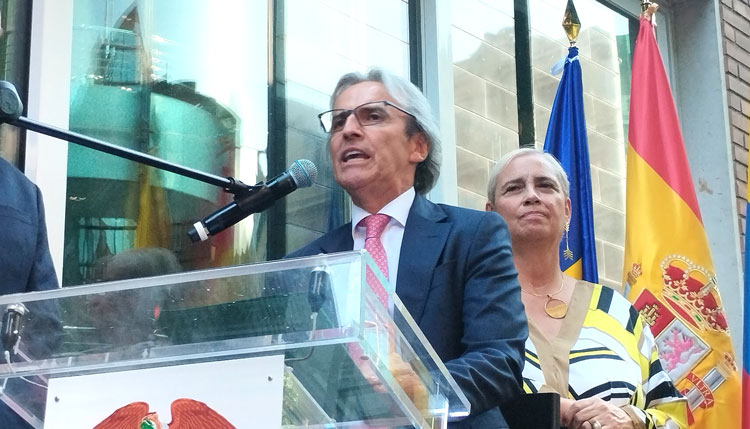Juan David Latorre
The Embassy of Colombia held last Wednesday a reception in its gardens to commemorate the Colombian Independence Day, which officially takes place every year on 20 July.
The Ambassador of Colombia, Eduardo Ávila Navarrete, underlined the reason for the advance of the celebration “to share with you in this meeting of fraternity and depth of bonds of friendship”.
“This embassy, the ambassador pointed out, conceived as a space of open doors, receives them with the conviction that diplomacy is exercised not only in the great halls, but also in the proximity to the citizenry, in the daily work, in constant dialogue and shared commitment. In my almost three years as ambassador, I have shared efforts, ideas and projects with many of you that enrich the ties between Colombia and Spain and translate into tangible benefits for our community. Thanks to our joint work, we have made substantial progress and expanded scholarship programmes both in Spain and Colombia, opening up new educational opportunities for young Colombians.”
Eduardo Ávila gave a brief overview of what he has achieved during the three years he has led the Colombian diplomatic delegation in Spain. “We have reached important agreements on professional evaluation, he said, particularly for health and care personnel, sectors that are critical to our communities. This is the government’s embassy of change and as such we have promoted policies that generate welfare from circular migration agreements with Spanish autonomous communities to the implementation of satellite connectivity in remote regions of Colombia, ensuring access to communication, education and the rights of Colombians.”
“This diplomatic and consular mission also stands out for its support to our nationals, which is why today I would like to acknowledge with deep respect the tireless work of the consuls and their teams who every day extend a hand of solidarity to our nationals by offering guidance, Accompaniment and solutions, because migration is a right, not a crime, and today I want to tell all who are with us that we must be alert to prevent the advance of racism in any area of public life. Eliminating racism is a democratic duty,” said Ambassador Avila Navarrete.
“Today I also want to emphasize the unrenounceable commitment of our government to peace, said the ambassador of Colombia, a peace that is not only absence of conflict but active presence of social justice, opportunities and hope. We have accompanied concrete initiatives with training programs for young people, productive projects with peasant women and indigenous survivors of the conflict, who today export Colombian coffee with great success to the Spanish market.”
Then, Ambassador Eduardo Avila thanked “the constant support of the Spanish state. We are deeply grateful for the determined support of your government, the Ministry of Foreign Affairs, the Spanish Cooperation Agency and most especially the strong multi-party support that we have received with peace”.
“In the multilateral arena, he continued, Colombia maintains a strong defense of international law and a fairer global system. Our president recently reiterated his commitment to diplomacy to protect life, nature, sustainability and biodiversity. In this regard, Colombia, which holds the second presidency of CELAC, strongly supports the Fourth CELAC-European Union Summit, to be held in November in Santa Marta, as a space for regional integration from the global south, where Latin America and the Caribbean can speak with their own voice and dignity.”
With regard to cultural diplomacy, Ambassador Eduardo Ávila highlighted the “promotion of events that enhance our roots, knowledge and creativity. Today we have our magnificent expressions of it. For example, the exhibition Mambeo, tiempo y palabra de la sierra, by the artists Andrés Rodríguez and Huicamey Torres, indigenous Arhuaco, which brings us closer to the rituals and worldview of the indigenous peoples of the Sierra Nevada de Santa Marta. The functions also present today of Chimiminagua, directed by Venus Albeiro Silvia, who offers to the youth tools of transformation through art in the neighborhoods of Bogotá, such as Bosa. The concert of Grupo Canela, a women’s orchestra directed by María Fernanda Mumbrera, reference of talent and perseverance with more than 30 years of existence. And the Remansos Group, an exponent of traditional music from the Pacific and a representative of the Colombian cultural diaspora in Spain”.
The Colombian ambassador concluded his speech by saying that “today we proudly celebrate our Colombianism, highlighting Valle del Cauca as one of the most emblematic tourist destinations in the country of beauty. Its capital, Santiago de Cali, is projected as a vibrant and welcoming city, which during COP 16 showed the world its warmth, cultural diversity and enormous potential”.
